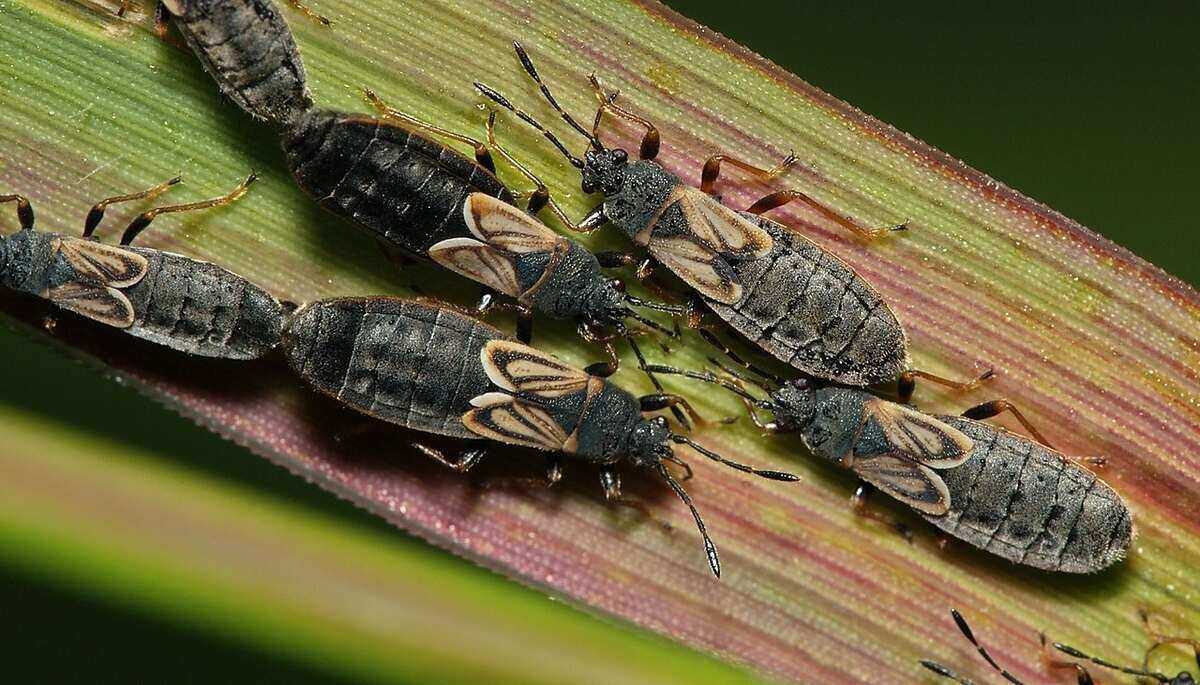
If you see expanding patches of brown, dead-looking grass in your lawn, you may have chinch bugs. Not to worry, though. We’ll explain how to get rid of chinch bugs and restore your lawn.
The biggest threat to your lawn is thatch buildup, as high thatch levels create the ideal environment for chinch bugs. This is actually good news. It means that proper lawn care practices, such as adequate watering, proper fertilization, dethatching, and mowing, are the best ways to get rid of chinch bugs in your lawn. If needed, chemical control is another option.
How to Know You Have a Chinch Bug Problem
Brown or dying patches of grass are a sign you might have chinch bugs invading your yard. But before you run to buy a sprayer and an insecticide, do these two things: First, ID your pest. Second, determine the level of infestation.
These two things will help you know whether chinch bugs are the problem and decide on the best treatment option for your lawn.
What Is a Chinch Bug?
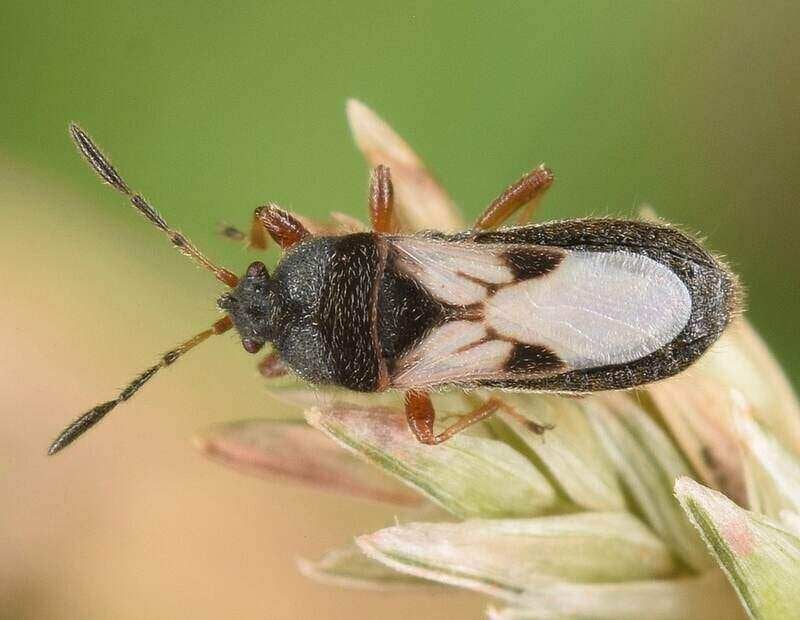
Chinch bugs are insects that enjoy hot, dry climates and are especially common in the South on St. Augustinegrass lawns. Adult chinch bugs typically have a black body and white front wings, while adolescent nymphs may be orange, red, or black with a white stripe.
These summer lawn pests feed on sap in the grass and inject a toxin that kills the plant’s tissue. The result is that grass wilts and becomes discolored, and the damage they cause creates brown patches in the lawn. Left untreated, chinch bugs will eventually kill the grass.
Chinch bug damage often resembles drought stress or lawn diseases such as dollar spot and brown patch. If you suspect chinch bugs, check your yard, driveway, and sidewalk for crawling or dead bugs. You will need to treat chinch bugs in the summer months. Depending on your geographic region, there can be 2-6 generations of chinch bugs each year.
Pro Tip: Don’t mistake chinch bugs for sidewalk mites, reddish insects that resemble chinch bug nymphs. Sidewalk mites are actually beneficial predators that eat nuisance insects.
If getting rid of these lawn pests yourself is too much work, LawnStarter can help you find a local pest control company to take care of them for you.
How Can You Test for Chinch Bugs in Your Lawn?
Once you’ve confirmed that you have chinch bugs, it’s time to determine how many. If you see fewer than 15 to 25 chinch bugs per square foot, there’s no need to use insecticides. Populations at or over this level can damage the lawn, so it’s recommended to consider applying some type of treatment to kill the bugs.
Perform the coffee can test to identify the level of chinch bug infestation in your lawn. Follow these steps:
- Remove both ends of a tin can (such as a coffee can).
- Insert one end 2 or 3 inches into the turf.
- Fill the can with water from a hose. Keep the water level high for at least 5 to 7 minutes. If chinch bugs are present, they should float to the top.
- Count the number of chinch bugs present to determine the number in that area.
- Repeat this process a few times along the edge of the brown patches to get a good average.
Cultural Control for Chinch Bugs
Many species of chinch bugs live in the U.S., but when it comes to getting rid of chinch bugs, controlling your lawn’s environment helps no matter which species live in your area.
The most effective way to get rid of chinch bugs is simply to take good care of your lawn by implementing good cultural practices. A healthy lawn reduces the risk of a chinch bug infestation. It also strengthens the grass to better withstand stressors, like insect feeding, when they occur.
Dethatching
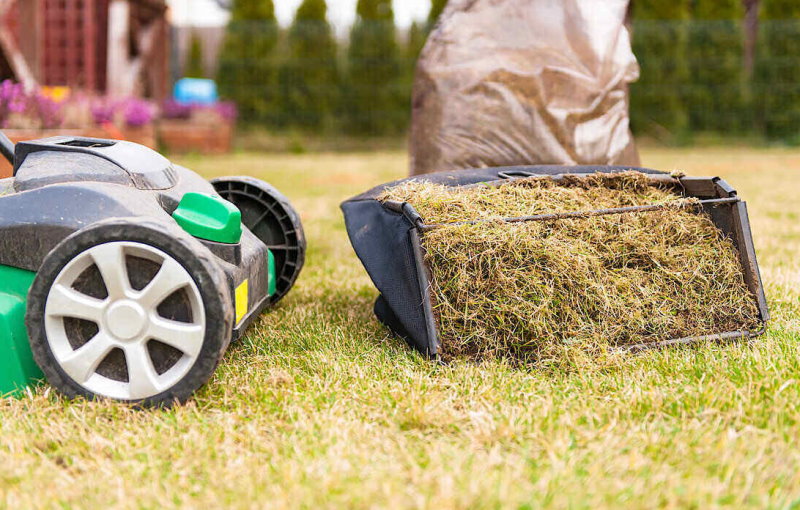
When you’re managing chinch bugs, excessive thatch levels are the biggest problem. High levels of thatch attract chinch bugs to your lawn because thatch creates places for them to hide. This means that maintaining a reasonable amount of thatch in your yard, under 1/2 inch, is essential for getting rid of chinch bugs.
Dethatching your lawn is the best way to reduce high thatch levels and get rid of chinch bugs in your yard. There are two main ways to get rid of thatch buildup:
- Use a dethatching rake to rake up the thatch in your grass (best for very small areas).
- Use a dethatcher: A dethatcher is a machine that will remove thatch from your yard (best for large areas).
The best time to dethatch your lawn is in spring if you have warm-season grass like St. Augustine or Zoysia; dethatch cool-season lawns in fall (ideal) or spring. Dethatching your lawn also prevents chinch bugs from taking shelter in your thatch layer over winter.
Additionally, if you do have to apply chemicals, dethatch the lawn first. Excessive levels of thatch prevent insecticides from seeping into the grass below, rendering chemical treatments ineffective.
Pro Tip: St. Augustinegrass tends to develop thatch more easily when it is over-watered or over-fertilized.
See Related:
Aeration

Though it’s less effective than dethatching, aeration also reduces the amount of thatch in your yard, which is essential for getting rid of chinch bugs.
Core aeration, which can be helpful for removing lower levels of thatch, works by pulling cores of soil (and thatch) from your lawn. This opens up your lawn so that fertilizer, oxygen, and water can filter down to the roots of the grass, creating a healthier, more resilient lawn.
See Related: How Much Does Aeration Cost?
Proper Mowing
Cutting your lawn at the right mowing height is important to maintain healthy turfgrass. Grass cut at its ideal height, and 1/2-inch taller than this in summer, is able to make enough food for itself via photosynthesis and develop strong roots. Taller grass also helps shade the soil, reducing evaporation and maintaining higher moisture levels.
In addition, using a mulching mower to cut your turf returns valuable nutrients, like nitrogen, to the lawn, leaving you with a lower fertilizer bill. The extra nutrients also strengthen your grass during the summer fertilizer blackout season, which is common in places like Florida, where St. Augustinegrass is prevalent.
Pro Tip: Follow the one-third mowing rule to ensure that you don’t overstress your lawn, leaving it more vulnerable to insects and disease.
Proper Irrigation
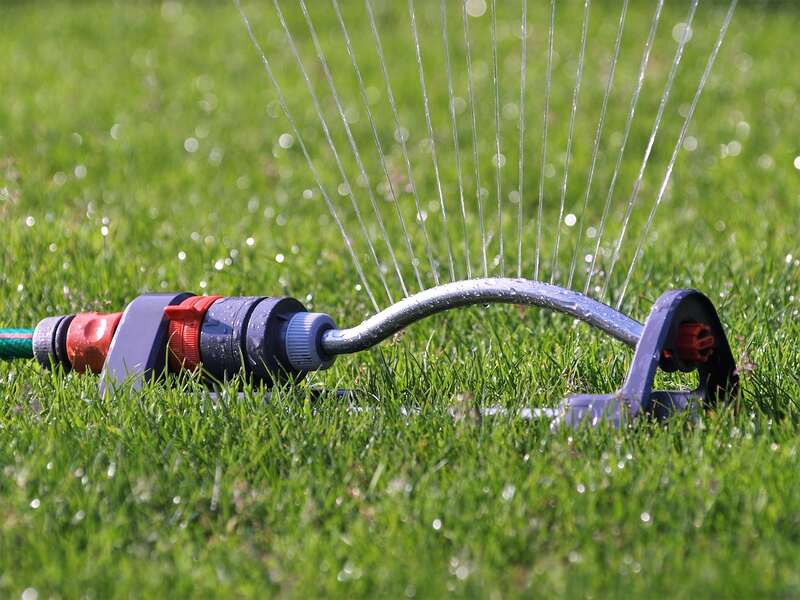
Non-irrigated lawns are especially susceptible to a chinch bug infestation since these pests thrive in dry, hot conditions. Moist conditions, though, discourage them from taking up residence.
Here’s one reason why: When your yard is moist from irrigation or rainfall, conditions are perfect for the fungal pathogen Beauveria bassiana. This fungus grows naturally in soil and may reduce populations somewhat in cooler, wetter climates (northern U.S.). It’s not a help in southern states, though.
In general, give your lawn 1 inch of water per week, including rainfall, to keep your grass healthy and discourage pests. Watering deeply once or twice per week is ideal. But if you have sandy soil, which is common in some southern states like Florida, water two to three times per week (0.5 to 0.3 inch each time) since sandy soils dry out quickly.
Pro Tip: Excess thatch impedes the flow of water, which keeps the soil surface moist and inhospitable to chinch bugs. So if you have excess thatch, simply watering more won’t be effective.
See Related:
Plant Resistant Turfgrasses
Avoid planting St. Augustinegrass, as that is the turfgrass species most susceptible to chinch bug invasions. Instead, choose a species of turfgrass that is resistant to chinch bugs.
- In your cool-season yard, consider endophyte-enhanced perennial ryegrass, fine fescue, and tall fescue for overseeding or planting a new lawn.
- In warm-season lawns, centipedegrass is the most resistant against the southern chinch bug.
See Related:
Fertilize
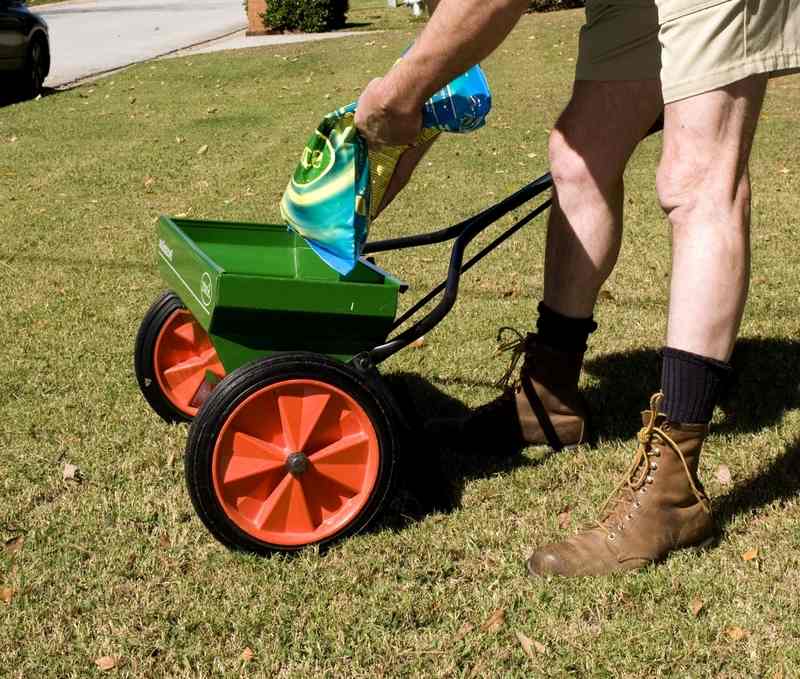
Be careful with fertilizer, as high levels of nitrogen can encourage both thatch and chinch bugs hungry for delicious top growth. Moderate fertilization will keep your yard healthy and chinch bug-resistant.
Don’t apply more than 3 to 4 pounds of nitrogen per 1,000 square feet per year as a general rule. There are two ways to ensure that you don’t overdo it on fertilizer:
- Use a slow-release fertilizer.
- Apply only small amounts of fertilizer to your yard at a time. Usually, 0.5 to 1 pound per 1,000 square feet is sufficient.
Note: Fertilizer rates vary widely depending on your state (even your location within the state), grass type, soil type, etc. Always check with your local Extension office to determine the fertilizer schedule that works best for your turf, and be mindful of fertilizer blackout dates in your city or state.
See Related:
Natural Control for Chinch Bugs
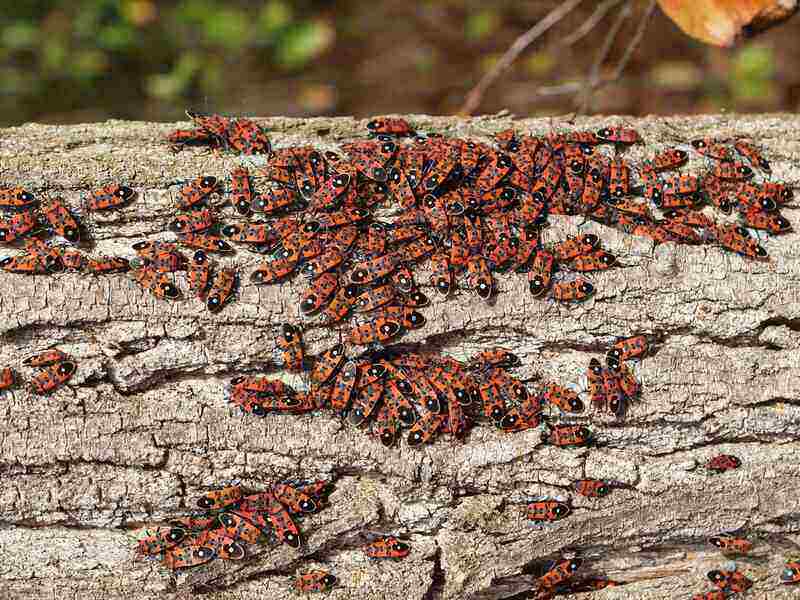
If you don’t want to use chemical treatments on your lawn, you might prefer natural methods. Fortunately, there are a few methods for getting rid of chinch bugs that don’t involve the use of chemical insecticides.
Natural Enemies
Fortunately, when it comes to getting rid of chinch bugs, you are not alone. To encourage these beneficial natural predators to your lawn, avoid using insecticides that kill them. It also helps to plant plants that attract beneficial predators by providing them with shelter, pollen, and nectar.
Chinch bugs have several natural predators that eat away your chinch bug problem:
- Ants
- Big-eyed bugs
- Earwigs
- Minute pirate bugs
- Spiders
- Wasps
The primary natural predators of chinch bugs are big-eyed bugs (Geocoris spp.). Although big-eyed bugs resemble chinch bugs in appearance and can be easily mistaken for them, they are actually beneficial natural predators that prey on chinch bugs and other insects.
Parasitic wasps are a type of predatory wasp that prey on many types of lawn pests, including chinch bugs. These predatory wasps attack chinch bugs and their eggs, which may help reduce the chinch bug population.
Beneficial Nematodes
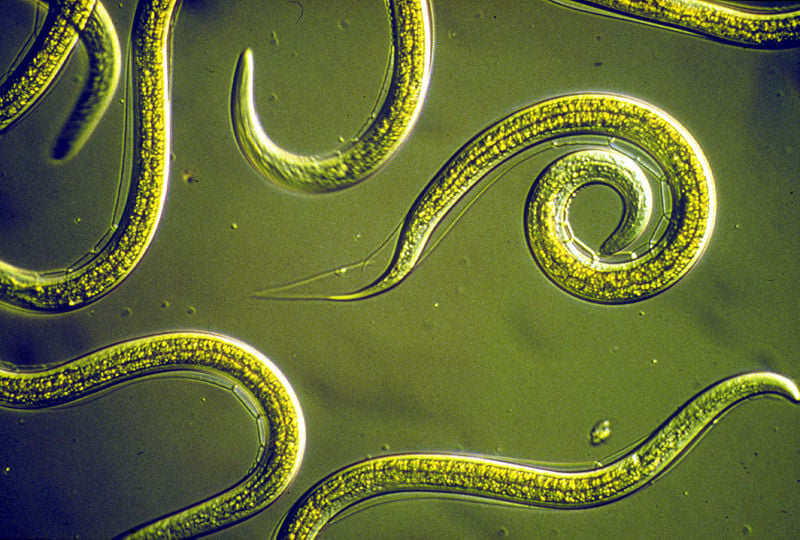
Although results are inconsistent, applying populations of beneficial nematodes might provide some control over a chinch bug problem.
Beneficial species available commercially include:
- Steinernema carpocapsae
- S. feltiae
- S. glaseri
- Heterorhabditis heliothidis
- H. bacteriophora.
If chinch bugs have started to overwhelm your yard, try introducing beneficial nematodes in your yard for a natural solution. However, there is not much research on the impact of beneficial nematodes on chinch bugs, so this solution is more experimental.
Beauveria Bassiana
As we mentioned above, Beauveria bassiana is a fungus that can have some effect on chinch bugs. While it may sound counterintuitive to introduce a fungus to your yard, Beauveria bassiana affects only insects, including chinch bugs.
The problem with using Beauveria bassiana is that studies have shown that the fungus is not enough to control severe chinch bug populations. It works best in the earliest stages of feeding. While not consistently effective, commercial strains of this biopesticide are available for lawn treatment.
Chemical Treatment for Chinch Bugs
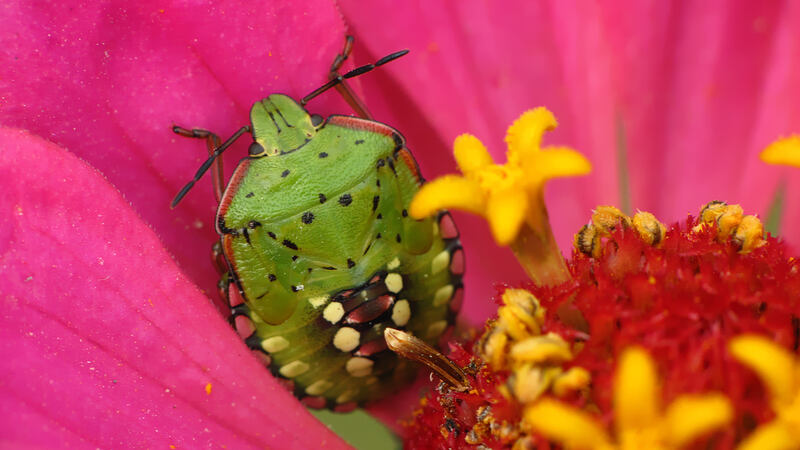
Ideally, you should always attempt to treat your chinch bug infestation with good lawn care practices or natural treatments before turning to chemical treatments. A good lawn care routine makes your yard inhospitable to chinch bugs and is the most effective way to get rid of these pests.
But when there are 15 to 25 chinch bugs per square foot, an insecticide application may be necessary for effective pest control. Use insecticides sparingly, as necessary, and only apply them in areas of the yard where you’ve confirmed chinch bugs are present.
Curative Insecticides
For homeowners, the best curative insecticides for chinch bugs are contact insecticides, specifically carbaryl or certain pyrethroid pesticides, including these:
- Bifenthrin
- Cyfluthrin
- Lambda-cyhalothrin
- Permethrin
Pro Tip: Consider applying insecticides only as a last resort. Pyrethroid insecticides also kill beneficial natural predators like spiders and big-eyed bugs that keep chinch bugs in check.
Preventative Insecticides
If you’re interested in preventative insecticides, hire a pro to apply these in late spring or early summer in areas where chinch bugs have been a recurring problem. Preventive chemical control products are not usually sold in quantities that are practical for homeowners. Also, in many states, only licensed applicators can purchase them.
Safer options for preventing chinch bugs include dethatching your lawn in spring, watering well, and not over-fertilizing.
Notes on Applying Insecticides
Insecticides come in both liquid and granular forms.
- Granular insecticides should be applied with a fertilizer spreader.
- Liquid insecticides typically come equipped with a hose-end sprayer or in a concentrate that must be diluted in a backpack weed sprayer.
Before you start applying insecticides to treat your chinch bug infestations, here are some tips to keep in mind:
- Irrigate your lawn before you apply any insecticides.
- Always read the label instructions before you apply pesticide chemicals on your lawn.
- Wear protective, baggy clothing and other protective gear (goggles, gloves, closed-toe shoes) to keep insecticide spray from touching your skin.
When to Call a Professional
For a severe chinch bug problem, there comes a point when it’s best to throw in the towel and call in a pest control pro to help.
But the best way to prevent and manage chinch bug populations over time is to implement good cultural lawn care practices, and there are pros for that, too. Hire a local pro to dethatch or aerate to reduce excessive thatch levels and fertilize properly. Finally, call in a lawn care pro to give your lawn the regular mowing it needs.
FAQ about How to Get Rid of Chinch Bugs
It depends on the grass type. As long as the chinch bug damage is not severe, St. Augustinegrass, for example, spreads by stolons, so it can grow new daughter plants. Kentucky bluegrass, which spreads by rhizomes, can also produce new growth to fill in the lawn.
Bunching grasses like perennial ryegrass don’t spread and must be overseeded if they have been killed by chinch bugs.
St. Augustinegrass is among the most susceptible grasses for a chinch bug infestation. However, chinch bugs are attracted to many types of turfgrasses, including:
• Bahiagrass
• Bentgrass
• Bermudagrass
• Fine fescues
• Kentucky bluegrass
• Perennial ryegrass
• St. Augustinegrass
• Zoysiagrass
Getting Rid of Chinch Bugs is a Cinch
When dead patches of brown grass appear on your lawn, it might be a sign of chinch bug infestation. Modify your irrigation, fertilization, mowing, or dethatching as needed to restore your grass to health again.
If you feel overwhelmed by all the yard care chores, don’t worry. LawnStarter can help you find a local pest control company to apply chinch bug treatment and the perfect lawn care pro to mow the lawn going forward, helping your lawn to recover and thrive.
Sources:
- “Beneficial Nematodes.” University of California.
- “Big-Eyed Bug.” By David Orr, extension specialist and associate professor. NC State Extension.
- “Chinch Bug.” By Phil Nixon. University of Illinois Extension.
- “Chinch Bug.” Michigan State University Extension.
- “Chinch Bugs.” By Ben McGraw, associate professor of turfgrass science, and Danny Kline, extension educator. Penn State Extension.
- “Chinch Bugs.” By Pat Vittum. UMass Extension Turf Program.
- “Chinch Bugs.” University of Georgia Extension.
- “Contact Insecticides.” Texas A&M AgriLife.
- “Endophyte-Enhanced Grasses.” UMass Extension Turf Program.
- “The Chinch Bug Fertilizer Relationship.” University of Florida.
- “Using Beauveria Bassiana for Insect Management.” By Ellie Groden, associate professor of entomology. University of Connecticut.
Note: LawnStarter may get a referral fee for matching you with pros in your area.
Main Image Credit: Sarefo / Wikimedia Commons / CC BY 2.0